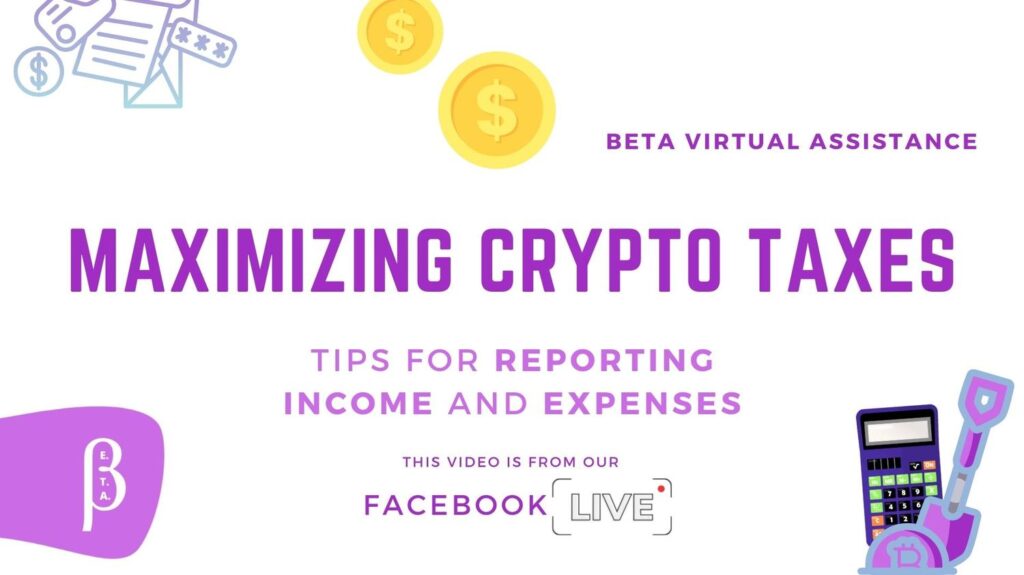
Explore the complexities of crypto income and taxes in this comprehensive blog post. Learn how different types of crypto income, from capital gains to mining, impact your tax liability. Discover valuable insights on reporting expenses and optimizing your tax strategy. Stay informed and make the most of your cryptocurrency investments.
(This post is from our series of Facebook Lives. Catch the next one on our Facebook channel.)
Introduction
Hello, crypto enthusiasts! In this blog post, we’ll dive into the world of crypto income and expenses and how they impact your tax obligations. Whether you’re a seasoned crypto trader or just getting started, understanding tax implications is essential. So, let’s get started!
Types of Crypto Income
When it comes to reporting your crypto income, it’s essential to know the various types and how they affect your tax liability. Here are the main categories:
Capital Gains
- Capital gains result from buying and selling cryptocurrencies.
- In the United States, they are categorized into long-term and short-term gains, each taxed at different rates.
- Long-term gains (held for over a year) are taxed at a lower rate, while short-term gains (held for less than a year) are taxed as ordinary income.
- Reporting capital gains typically involves using Schedule 8949, which feeds into Schedule D for tax purposes.

Rewards and Bonuses
- Sometimes you receive small amounts of crypto as rewards or bonuses. These should be reported as income, even if they are valued at less than a penny!
- Tax software can help import and categorize small amounts correctly.
Interest and Dividends
- Income from holding crypto in an Earn program will need to be reported separately from trades.
- Not every crypto tax software reminds you to report your income or makes it easy to do so. Choose your tax software carefully!
Mining Income
- If you engage in cryptocurrency mining, it’s often considered self-employment income in the US.
- This income is subject to both ordinary income tax rates and self-employment taxes (an additional 15%).
- Consider structuring mining earnings within a corporation to potentially reduce self-employment tax liability.

NFT Rentals
- Renting out NFTs can also generate income, potentially subject to self-employment tax. Seek expert guidance for this category as different NFT’s may qualify for different tax situations.
Liquidity Pool Income
- Depositing funds into liquidity pools in DeFi protocols can be complex.
- Some portions may be considered a Return of Capital, while others might be earnings or trades.
- Ensuring your tax software correctly categorizes these transactions is crucial.
Expenses to Consider
Now that we’ve talked about the varieties of income you need to report, let’s take a look at the expenses that might help lower your tax bill. While most crypto-related expenses aren’t deductible for US taxpayers, there are a few exceptions:

Trading Fees
- Trading fees are often included as part of your trade’s cost basis and aren’t separately deductible. Your crypto tax software usually includes these automatically as part of your cost basis and sales figurations.
Withdrawal and Transfer Fees
- These fees aren’t typically deductible for US investors but maybe for Canadian investors or other nationalities.
Education and Software Costs
- Expenses related to courses and software for crypto trading may be deductible, especially if you’re operating your crypto investments as a business. Check with a specialist to find out more.
Conclusion
Navigating the world of crypto taxes can be challenging, given the unique nature of cryptocurrency transactions. It’s essential to stay informed and use reliable tax software to ensure accurate reporting. Additionally, consider consulting with tax experts or specialists to optimize your tax strategy.
Remember, being smart about how you structure your crypto investments, such as utilizing Roth IRAs or business accounts, can have a significant impact on your tax liability. If you have questions or need assistance with crypto taxes, feel free to reach out to us. We’re here to help you make informed financial decisions in the crypto world.
Join us for our regular sessions on Tuesdays and Thursdays at 4 p.m. Eastern, where we discuss crypto taxes and smart investing practices. We also dive deeper into investment strategies and safety on Saturdays at 10 a.m. Eastern. Don’t hesitate to send us your questions or explore our blog and YouTube channel for more valuable insights. Stay informed and make the most of your crypto investments!
Reach out to us for any assistance with your crypto taxes. Book a call here.
Did you read our previous post about crypto taxes titled: “Crypto Tax Alert: The Celsius Dilemma and Its Impact on Your Financial Strategy“
Find out more about this topic by listening to our Audio podcast or watching our YouTube video below.





Leave a Reply